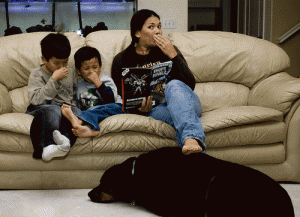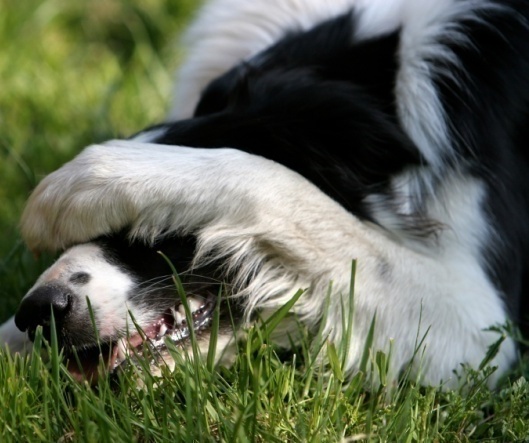(Yahoo) We don’t like to compare cats and dogs – both pets have so many lovable qualities! it’s not a competition! – but we will give the edge to cats in one respect: they’re self-cleaning. We adore dogs, but there’s no denying that, when it comes to smelling bad, they’ve got cats beat paws down.
 But why do dogs get so smelly sometimes?
But why do dogs get so smelly sometimes?
Well, let’s start with the obvious: they get dirty. Most dogs spend a decent amount of time outside, and they may spend part of that time rolling around in trash, poop, or other icky things (they do this to camouflage their own smell). Not every dog likes to do this…but yours may love it.
Or maybe Rex just got caught in the rain; a wet dog is a notoriously stinky proposition. That smell comes from bacteria that feed on the oils produced by a dog’s skin, so the best way to beat that odor is to bathe the dog regularly; dry him thoroughly after baths; and keep him dry in between.
Groom your dog each day, too. Even a quick brushing before bedtime can get help you spot and get rid of dirt and gunk that’s clinging to his coat (or little “cling-ons” that might be lingering under his tail). Check between his toes to make sure he doesn’t have anything stinky lodged there, or consider a quick foot bath just to make sure (hounds of our acquaintance will happily cut through their own urine or waste during walks).
But if a nice relaxing bubble bath or “pedicure” doesn’t kill the stench, it’s time to look elsewhere. First, try bathing the dog’s bed, crate, and/or anywhere else he regularly lies down. If he’s clean but his favorite sofa cushion is funky, he’s just going to get smelly again in ten minutes. Wash his bed, any padding he lies on, et cetera on a regular basis – and if he’s got a “home” chair or spot on the rug that can’t be easily laundered, start putting a fluffy towel or bed facsimile in that spot so it’s easy to run through the wash.
…Still catching a bad whiff? You may be looking at a medical issue, so enlist your vet to help solve the mystery. Fido may have a skin infection that regular bathing and dog shampoo won’t defeat; dog breeds with skin folds may be more prone to this, so have your vet take a look.
Or is it Fido’s breath? He’s probably never going to smell minty-fresh, but particularly revolting breath could spell a dental problem like a rotten tooth or gum disease; bad breath could also indicate a digestive issue. Have a veterinarian take a look, and recommend chew toys and/or dental products that will keep the dog’s teeth clean.
Ear conditions like mites can also create some unpleasant odors. Does your newly-bathed dog still smell like old shoes – and is he also scratching his ears or shaking his head a lot? It might be mites. Call the vet for a recommendation or some drops.
Or…maybe that funk is coming from the other end. Dogs can eat things they shouldn’t and cause themselves gastric distress, including noxious flatulence; usually, though, you can trace a given series of poots to the coffee grounds or scrambled eggs Corky helped himself to last night. But if you know he’s only eating his regular kibble and his gas is frequent and/or horrible, ask your vet about changing the dog’s diet and/or running some tests. Most dogs are lactose-intolerant, so make sure he’s not snacking on unauthorized cheese, and see what the vet has to say about probiotics (which help promote intestinal flora), getting more exercise (which can cut down on the toots), and feeding methods (wolfing down meals could lead to gas).
Maybe it’s not just air, either. Secretions from a dog’s anal glands can generate one of the worst smells known to humans. If your dog is prone to impactions or other problems “near the back door,” you may have to ask your vet about expressing those glands regularly. …We know, trust us; we have a cat with this…”situation,” and it is yucky and undignified for everyone involved. But you can handle it yourself…or you can wait until the pooch “handles” it on a vintage needlepoint pillow, or starts dragging his tuchis along the carpet in front of your new in-laws. Talk to a vet, and then possibly your groomer/doggie daycare provider, about managing a gland issue.
Keeping your dog smelling sweet – or at least not awful – is mostly a matter of prevention, it seems. Regular baths, paired with checks of your dog’s ears, teeth, and paws; regular laundry; and regular vet visits should all help you not have to breathe through your mouth every time Rover enters the room.
How do you keep your dog smelling like a daisy? Or have you just learned to tolerate a certain funk? Share your secrets for a sweet-smelling pooch in the comments!

